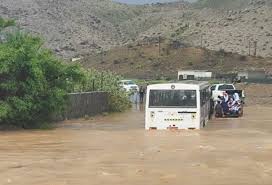AS the first rains of 2025 begin in line with the prediction of the Nigerian Meteorological Agency, NiMET, the Federal Ministry of Water Resources and Sanitation will soon unveil its 2025 Annual Flood Outlook, AFO, in a move that would show the rainfall patterns, water levels, impacts, states and local government areas to be affected.
The impact of the 2024 floods is yet to be forgotten as floods wreaked havoc, claiming about 465 lives and injuring 2,712 others.
The 2024 floods also affected over 1.2 million people across 31 states, with 180 local government areas severely impacted.

Battered states include Borno, Bauchi, Benue, Adamawa, Kebbi, Anambra, Lagos, Bayelsa, Delta, Niger, and Kogi.
Meanwhile, Alau Dam in Borno State on September 10, 2024, burst, thus aggravating the disaster and killing about 150 people while displacing over 419,000 others.
The situation led to humanitarian crisis in Borno, which attracted national and global attention to salvage the lives of survivors.
Also, Bauchi State had its fair share of the 2024 flood disaster that killed 24 people, injured 163 while over 122,000 persons were displaced.
The economic impact of the floods was huge as many businesses were crippled while homes and farmlands with crops and livestock as well as infrastructures adversely affected.
Speaking with Sunday Vanguard, environmentalists and human rights organizations, in this report, called on the government and Nigerians to be proactive ahead of the 2025 rains and floods and avoid being caught up in looming disaster.
They also urged citizens to be responsible and do the needful by leaving flood plains and lowlands early enough for higher grounds.
Farmers should use predictions to mitigate effects of flooding – AFAN President
The National President, All Farmers Association of Nigeria, AFAN, Kabir Ibrahim, asked farmers not to sit and allow the potential damage the 2025 rainfall patterns and flooding may cause, saying they should instead use the predictions of annual flood disasters across the country to mitigate impact.
“Flooding occurs when the downpour is such that the drains cannot contain the volume of water generated and the soil is so saturated that the water will collect and cause havoc”, Ibrahim said.
“To mitigate the potential damage we must make adequate provision of collectors to take away the flood waters away from the flood prone areas. This requires real engineering solutions from trained experts”.
Early warning
On what the authorities and Nigerians learnt from the 2024 floods and to ensure they are not waiting until another round of flood disaster devastates them, the AFAN boss counseled, “Early warning is the main reason for unveiling of the annual seasonal climate predictions and its purpose for all those responsible to be on their toes and therefore not to wait until disaster happens before taking action.
“The government and all Nigerians must commit to the reduction of greenhouse gases and clean all drainages as well as learn about good waste disposal systems.
“Farmers should use predictions to minimize or mitigate the effect of flooding and adverse weather or climate events.”
Nothing on ground to show difference in 2025 floods’ preparedness – RDI ED
An environmental rights activist and the Executive Director of Renevlyn Development Initiative, RDI, Philip Jakpor, expressed deep concern as he believes there is nothing on ground to show that the preparedness by government ahead of floods would be different in 2025.
Jakpor said: “The early warning systems by the Nigeria Hydrological Services Agency and NIMET are not just routine sound bites.
“They are put out there for the state governments and the emergency management agencies to prepare and act.
“What the state governments should be doing now is prepare their citizens, especially those who live in the coastal and low-lying plains, on the need to watch the rising waters and evacuate when necessary.
“They should be putting temporary shelters up in high-ground where such families can evacuate to in dignity instead of the ad-hoc approach they adopt when the floods come.
“Agencies like NEMA and their state counterparts should be informing us of equipment they have procured and things like speedboats or choppers to reach people who will be cut off by floods.
“They should be telling us about plans to open up the drains for free flow of water. Those are the kinds of things we should be hearing.
“But like it has always been, they shirk their responsibility and start asking for Ecological Funds.
“Authorities like NEMA and their state counterparts should be collaborating to address the issues that arise due to flooding.
“In the past we have seen them focused more on the sharing of rice than proactive measures to forestall or address real emergencies. I wonder about the obsession for rice.”
Meanwhile, he counseled, “Nigerians should save themselves by quitting areas that are prone to flooding.
“In the past, we haven’t seen much of government interventions that ameliorated the plight of displaced persons in flooded areas.
“It is every man for himself and there is nothing on ground suggesting it would be different in 2025.”
Activate mitigation measures ahead of 2025 floods —HOMEF ED
The Executive Director, Health of Mother Earth Foundation, HOMEF, Nnimmo Bassey, for his part, warned that the 2024 floods should wake up Nigeria, saying the waiting and sitting is too long, and now it is imperative to activate mitigation measures in 2025 as the rains are about to trigger another round of flooding across the country.
Bassey said: “Mitigation, we must recognize that as disastrous as floods are, they also announce a larger crisis – climate change.
“To mitigate the impact of floods, we need to have drainage master plans for our cities, and other communities. We also need to consciously ensure that our infrastructure is climate proof.
“This requires avoiding certain construction materials and methods of installation. Having coastal highways made with rigid reinforced concrete is an example of use of inappropriate materials regarding climate change.
“Another key point is the need to ensure that our dams are structurally sound and those that have been left uncompleted for are urgently completed. Poor management of our dams have triggered or compounded flood disasters.
“One key mitigation action is the protection and restoration of natural habitats, including wetlands, forests, and mangroves, which act as natural buffers against floods.
“If we are serious about this matter, land reclamation in our coastal zones must be stopped. One other point is the use and disposal of plastics that are clogging our waterways and drainage channels.
“Learning from the 2024 Flood: The 2024 flood was a wake-up call for Nigeria. We must learn from this experience and conduct a thorough assessment of the flood’s impact, identifying areas of vulnerability and opportunities for improvement.
“We must develop and implement comprehensive flood management plans that prioritize community-led initiatives and climate-resilient infrastructure.
“We must strengthen our emergency preparedness and response systems, ensuring that communities are not helpless during floods and other climate-related disasters. A lot of people lost their lives and properties due to unpreparedness in 2024.
“The floods of 2024 were catastrophic. Reports state that 2,504 people were injured and 285 individuals died. A startling 641,598 people were also displaced by the floods. 98,242 residences suffered property damage, several of them being completely demolished. Massive food losses resulted from the destruction of thousands of hectares of agriculture.
“Important infrastructure, such as public buildings, bridges, and roadways, was also harmed by the floods. It is important to note that 31 states in Nigeria were impacted by the floods, with Bauchi, Sokoto, and Zamfara suffering the most.”
However, the foremost environmentalist said, “Advice to Government: There have been a lot of engagements concerning mangrove restorations and wetlands, government should be aware that the actions we take on our wetlands are a major response to flooding in our society.
“In this regard, the government must promote community resilience, support community-based initiatives that enhance flood prevention, such as flood-risk mapping, early warning systems, and flood evacuation drills.
“Government should also be proactive to adequately inform and protect the people and their properties.
“Lastly, the government should prioritize climate action, recognizing that climate change is a pressing national security issue that demands immediate attention.”
Allocate resources now, act swiftly to save lives and safeguard the economy —Global Rights leader
In another reaction, the Executive Director, Global Rights Nigeria, Abiodun Baiyewu, called on the government to kick-start allocation of resources to promptly safeguard lives of Nigerians and the economy ahead of floods.
Bayiewu said: “We need to be proactive as a country as we brace for the rains of 2025. The potential for flooding is high and this poses a serious concern for lives, livelihoods, and the already fragile security of Nigerians.
“While NiMET’s predictions and the forthcoming Annual Flood Outlook from the Federal Ministry of Water Resources and Sanitation are commendable early steps, the urgency lies in translating these insights into tangible action.
“To mitigate the possible impact of the rains and floods, government needs to take proactive measures: The local governments should collaborate with community leaders to identify and clear flood-prone areas.
“We shouldn’t wait till the floods come before we insist that housing that falls out of urban plans or sits on the waterways must not be allowed to be built in the first place.
“Government must enforce regulations on waste disposal to prevent clogged drainage systems, which is a leading cause of urban flooding. “Given the fact that the government already knows the propensity for flooding is high this year, it must ensure that emergency shelters and evacuation plans are well-prepared and accessible.
“It should also establish a coherent early warning system that informs and empowers Nigerians to act on time.
“Beyond the floods this year, the authorities must focus on building resilient infrastructure, such as dams, embankments, and drainage systems.
“They should also invest in implementing climate adaptation strategies, especially in vulnerable communities.
“Prevention is cheaper than recovery. Allocate resources now, build partnerships with local and international stakeholders, and act swiftly to save lives and safeguard the economy.
“Nigerians should also not fold their hands and wait for the government, they need to organize at the community level to ensure that their community is resilient.
“Safeguarding is an all of society affair.
“Floods are not just environmental challenges–they are threats to our collective humanity. We all have a role to play in minimizing their impact.
“The 2024 monumental flood disaster and devastation should be a wake-up call to all Nigerians and government at all levels in order to prepare early enough and mitigate the possibly disaster the 2025 flood may hit Nigerians with and trigger another round of humanitarian crisis that could be avoided if there is that promptness by the relevant authorities.”
Reactive measures not needed to address flood challenges – ActionAid Country Director
The Country Director, ActionAid Nigeria, AAN, Andrew Mamedu, warned against reactive measures to address flood challenges.
His words: “To reduce the effects of heavy rains and potential flooding, we must invest in robust early warning systems and resilient infrastructure. “Upgrading drainage networks, reinforcing flood defenses, and regularly maintaining critical structures are essential steps.
“These measures allow us to activate timely evacuations and ensure that communities receive swift assistance.
“Our experience shows that proactive preparation—not reactive measures—saves lives and limits economic losses.
“Equally important is the integration of risk-financing mechanisms such as insurance schemes and contingency funds.
Empowering local communities through training and participatory planning ensures that each area has its own disaster management plan, tailored to its vulnerabilities.
“This dual approach—combining strong government leadership with grassroots preparedness—creates a resilient society that can better absorb and recover from future flood events.
“The floods of 2024 revealed critical vulnerabilities in our infrastructure and preparedness systems. “The collapse of key structures, such as the Alau Dam in Maiduguri, demonstrated the severe consequences of delayed maintenance and inadequate investment.
“These events have shown that our disaster management frameworks must be updated with regular monitoring, preventative maintenance, and robust design standards to withstand extreme weather conditions.
“Moreover, the 2024 disaster highlighted the importance of multi-stakeholder coordination.
“When government agencies, NGOs, and local communities work in unison, the response is more timely and effective.
“This experience reinforces that waiting until a disaster occurs is never an option.
“We must foster a culture of preparedness by integrating early warning systems, community training, and efficient emergency response plans into our national policies.
“I advise government to adopt a forward-thinking, evidence-based approach to flood management. “Prioritizing investment in resilient infrastructure, strengthening early warning systems, and ensuring effective coordination among all agencies are essential.
“Clear, transparent policies backed by sufficient funding and international support will not only reduce flood risks but also build public trust in our ability to manage disasters.
“To Nigerians, I urge active participation in local preparedness initiatives. Stay informed about weather forecasts and join community training programs to enhance your own resilience.
“Hold your leaders accountable for the implementation of effective flood prevention measures, and support efforts that integrate both top-down government planning and bottom-up community action.
“Together, we can build a society that is smarter, stronger, and better prepared for the challenges ahead.”
Alau Dam
Recently, President Bola Tinubu approved N80 billion for the rehabilitation of the Alau Dam that burst last year and caused severe flooding, while the Minister of Water Resources and Sanitation, Joseph Utsev, said work will commence on the project in February 2025, and it is expected to be completed within 24 months.
Stay ahead with the latest updates!
Join The Podium Media on WhatsApp for real-time news alerts, breaking stories, and exclusive content delivered straight to your phone. Don’t miss a headline — subscribe now!
Chat with Us on WhatsApp








